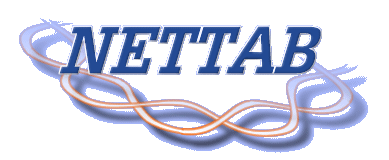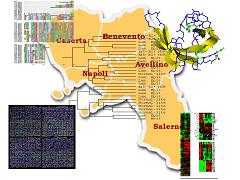
|
Joint NETTAB 2010 and BBCC 2010 workshops focused on Biological Wikis November 29 - December 1, 2010, Naples, Italy |

|
|||||||
Overview
NETTAB 2010 is the tenth in a series of international workshops on Network Tools and Applications in Biology
NETTAB workshops are aimed at presenting and discussing emerging ICT technologies whose adoption in support of biology could be of particular interest. Since 2001, many different topics were discussed, including:
- 2001: XML standardization for data integration,
- 2002: multi agent systems,
- 2005: computerised workflows,
- 2006: web services,
- 2007: the semantic web,
- 2009: tools for collaboration.
Workshops include focused sessions devoted to tools and systems, applications and perspectives. Keynote lectures introduce the sessions' topics, and are followed by presentations selected from among the submitted contributions.
Discussion is a key factor, both within sessions and in a special Panel Discussion.
Tutorials and poster sessions complete the agenda of the NETTAB workshops.
NETTAB 2010 Call for Papers
Rationale
It is now clear that wiki systems offer a variety of advantages for the management of biological data and information. Some of the specific aims of wikis for biology (bio-wikis) include:
- Collaborative development and sharing of knowledge
- Collaborative annotation of database contents
- Collaborative creation of database contents
The collaborative development and sharing of documentation and knowledge allows communities to promote, exploit, discuss and reach consensus on information, procedures, data, experiences, news, and other varied information. This aim is motivated by the awareness that valuable expertise and interests in special topics are usually distributed, and are rarely concentrated in a unique site or research group. The objective is the implementation of high quality compendia on specialist biological topics.
The collaborative annotation of biological databases leverages the fact that an extended and accurate curation of an ever increasing volume of data is extremely costly and time consuming. The aim is to improve and extend databases curation beyond that which is possible with, typically, a small number of curation staff. It allows users to contribute their expertise, experiences, observations and results independently of the database organization and staff. Users can control this extended curation, correcting and updating the archives in a timely manner. Although contents of the database are collaboratively annotated, databases themselves are left unchanged.
Collaborative creation of community database captures emerging structure in rapidly developing fields. These database-wikis are indexes of biologically relevant data that emerge from focused and rapidly developing communities. They form a stopgap between unstructured discussion in fora and on mailing lists and the 'mature' databases that emerge subsequently. They can be useful for discerning trends and promoting best practices, but often, by their nature, collect unique and important information.
In the future, collaborative 'wiki' update of almost all database contents could be imagined. However, this vision requires us to address several important issues:
- How reliable are user contributions?
- What format should annotations take?
- How to transfer this information into the 'authoratative' database?
Procedures should be implemented supporting the assessment of users' contributions, the extraction of structured data from annotations, the insertion of this data into the database.
From the analysis of above aims, some issues clearly stand out.
The authoritativeness of contributions and of sites is essential: how to assess quality? Quality of contributions is essential, but contributions from casual end users is usually considered not adequate to achieve a quality of contributions comparable with professional annotation at service centers. Otherwise, many wiki systems, e.g. Wikipedia, may anyway be considered successfull. Is their organization a possible way to go for accurate annotation of biological data? Alternatively, can usual criteria for assessing quality of research, including peer-evaluation of contributions and identification of users, be applied in this case?
Acknowledgement of users may be a way to stimulate contributions: how to stimulate quality additions? It is needed to stimulate good contributions, but how to attract the most experts in the field? Which kind of reward can be assigned to best contributors? Identification of their contribute in the wiki and the possibility of cite contributions may be a sufficient reward? Which further benefits may be imagined (subscriptions to services, journals, ...)?
Authorships management and reward may be a way to stimulate quality contributions: how to keep information on authors and assign these contributions a 'scientific production' value? Authorships assignment is a form of acknowledgement. It contributes to defining reliability of information, while providing authors due credits. It enables peer-review: authors can rate each other and an automatic reputation system can be implemented. It also allows a knowledge base to evolve into a rigourous scientific tool via continuous revision and peer-review. How to combine collaborative (and altruistic) features of wiki systems with authorships?
Special features may be required for biological data and information: how to manage the many, different data types? Textual information is only a small part of biological data. Biological data types are numerous and heterogeneous, depending on the domain. How to cope with the different data types: images, plots, diagrams? An adaptation of wiki systems is needed.
Many wiki systems are already available (see following table). A survey of existing systems could be useful, so that possible sinergies can be identified and supported, while removing duplication of efforts and promoting a coherent set of biological wikis.
| Brede Wiki: Results for neuroimaging studies | Ecoliwiki: Comprehensive information on Escherichia coli | GenWiki: Genealogy resource for German-speaking people |
| GONUTS: GO Normal Usage Tracking System: a wiki-based GO term browser. Allows community curation of GO annotations for any gene. | MetaBase: Biological databases | Metagenes: Metagenomic DNA sequences |
| PDBWiki: Macromolecular structures | Proteopedia: Annotation of protein structures and other biomolecules | SNPedia: Genetic polymorphisms |
| SubtiWiki: Genes of Bacillus subtilis | TOPSAN: Annotation of protein structures | WikiGenes: Gene wiki with authorships attribution |
| WikiPathways: Curation of biological pathways | WikiProteins: Protein wiki for structured data | ZebrafishGenomeWiki: Community annotation of the Zebrafish genome |
Tutorials demonstrating the actual applicability and usefulness of bio-wikis and introducing interested researchers to the arts of contributing, managing and implementing wiki systems.
Topics
The following list is not meant to be exclusive of any further topics as stated above.
Submitted contributions should address one or more of the following topics:
- Wiki development tools
- Wikimedia
- Wikimedia extensions
- Semantic Wikis
- Wiki-coupled CMSs
- Other wikis
- Arising issues for the biomedical domain:
- Authoritativeness of contributions and sites
- Quality assessment
- Users acknowledgement
- Stimulatation of quality contributions
- Authorships management and reward
- 'Scientific production' value for contributions
- Management of bioinformatics data types
- Wikis and collaborative systems for:
- Genomics, proteomics, metabolomics, any -omics
- Proteins analysis and visualization
- gene and proteins interactions
- metabolic pathways
- oncology research
- Issues to be tackled by wiki and collaborative research for:
- Genomics, proteomics, metabolomics, any -omics
- Proteins analysis and visualization
- gene and proteins interactions
- metabolic pathways
- oncology research
Type of contributions
Exact types of contributions and related authors' instructions will be available on the official launch of the Call. Presently, the following possible contributions are sought:
- Oral communications
- Posters
- Software demos
Deadlines
The following deadlines are subject to changes.
September 24, 2010: Oral communications submission
October 4, 2010: Oral communications submission (extended deadline)- Decisions announced: October 24, 2010
- October 17, 2010: Posters submission
- Decisions announced: October 24, 2010
- October 29, 2010: Early registration ends
- November 29 - December 1, 2010: Workshop and Tutorials
Instructions
Kindly follow the instructions carefully when preparing your contribution and submit your contribution through the EasyChair system at http://www.easychair.org/conferences/?conf=nettab2010.
All contributions should follow the same format, as specified here:
font type: Times New Roman, font size: 12 pti, page size: A4, left and right margins: 2.0 cm, upper margin: 2.5 cm, lower margin: 2.0 cm.
The lenght of contributions for oral communications should be between 3 and 5 pages, including tables and figures.
They should include: Abstract, Introduction, Methods, Results and Discussion, References.
All contributions for oral communications will be evaluated by at least three referees.
The length of contributions for posters should be no more then 3 pages, including tables and figures.
They should include: Introduction, Methods, Results, References.
All posters will be evaluated on the basis of their relevance fot the workshop's topics only.
For any further information or clarification, please contact the organization by email at info at nettab dot org.
Scientific Programme
Overview -
Programme
Speakers -
Tutorials
Posters
Presentations
Call for Papers
Overview -
Rationale
Topics -
Deadlines
Type of contributions
Instructions
Registration
Overview
Subscribe
Registration cost
Registration form
Useful Info
Contacts -
Location
How to find us
Deadlines -
Hotels
External links
Organization
Chairs
Scientific Committee
Organizing Committee
Institutes & Societies
Sponsors